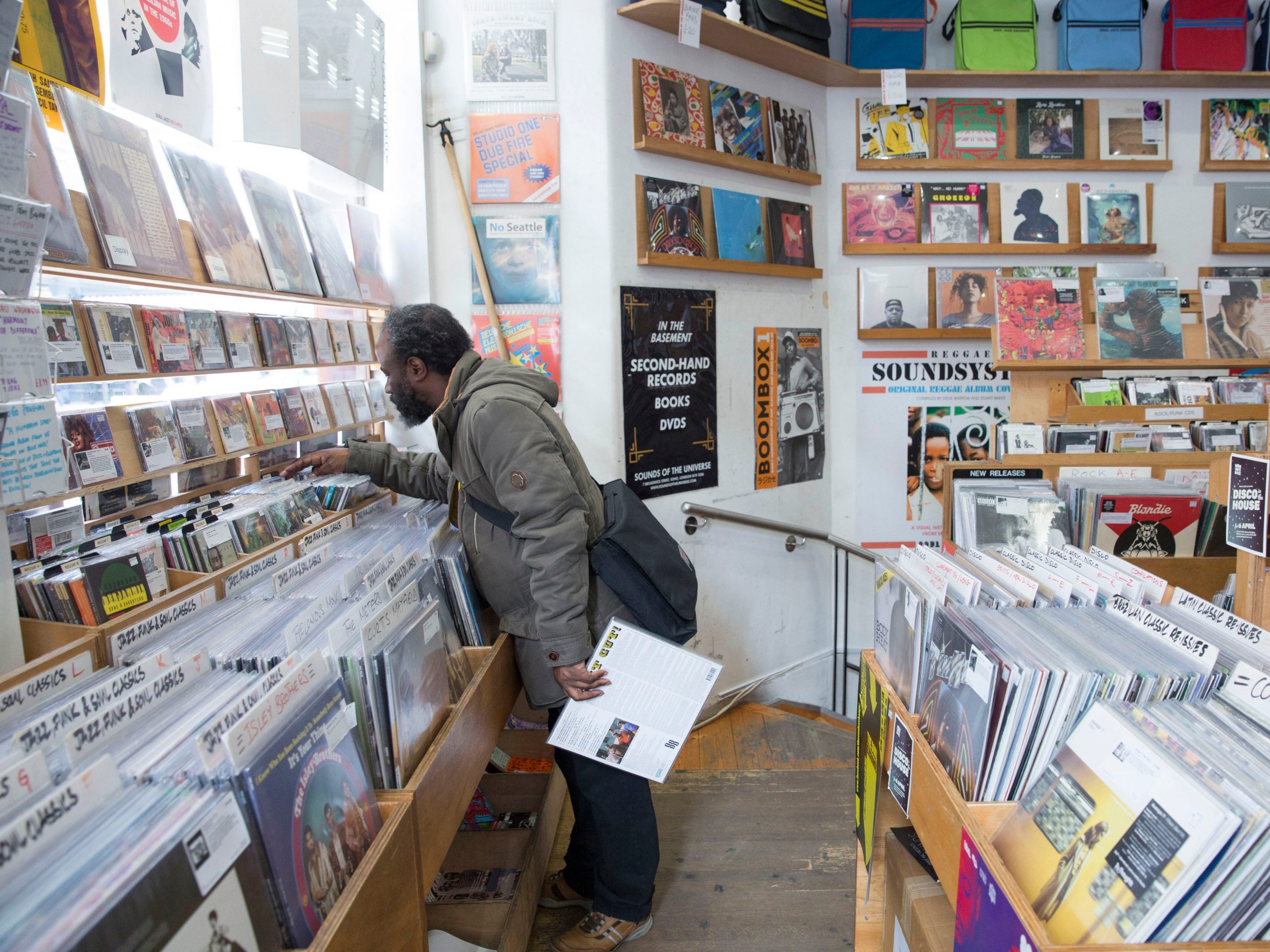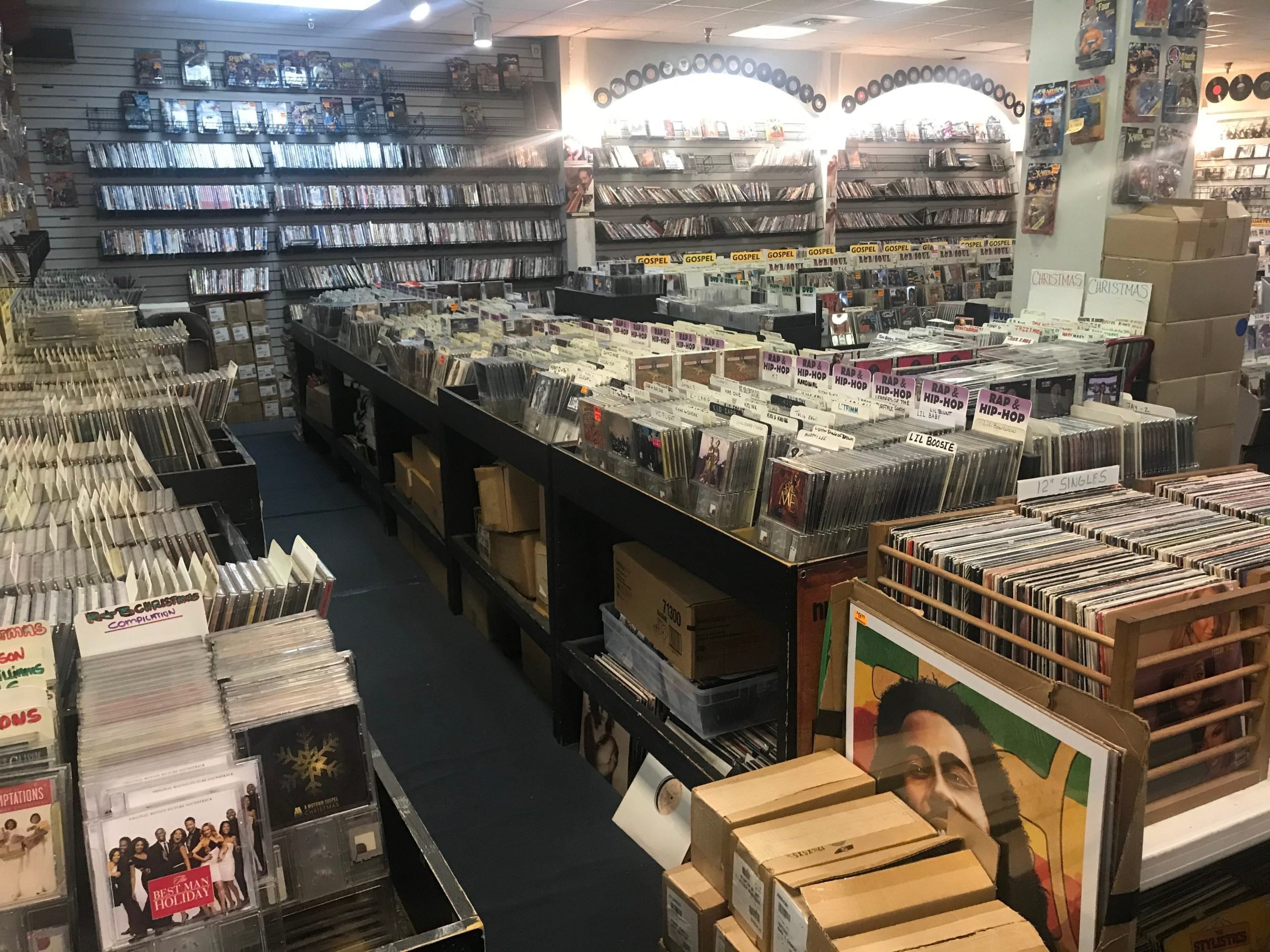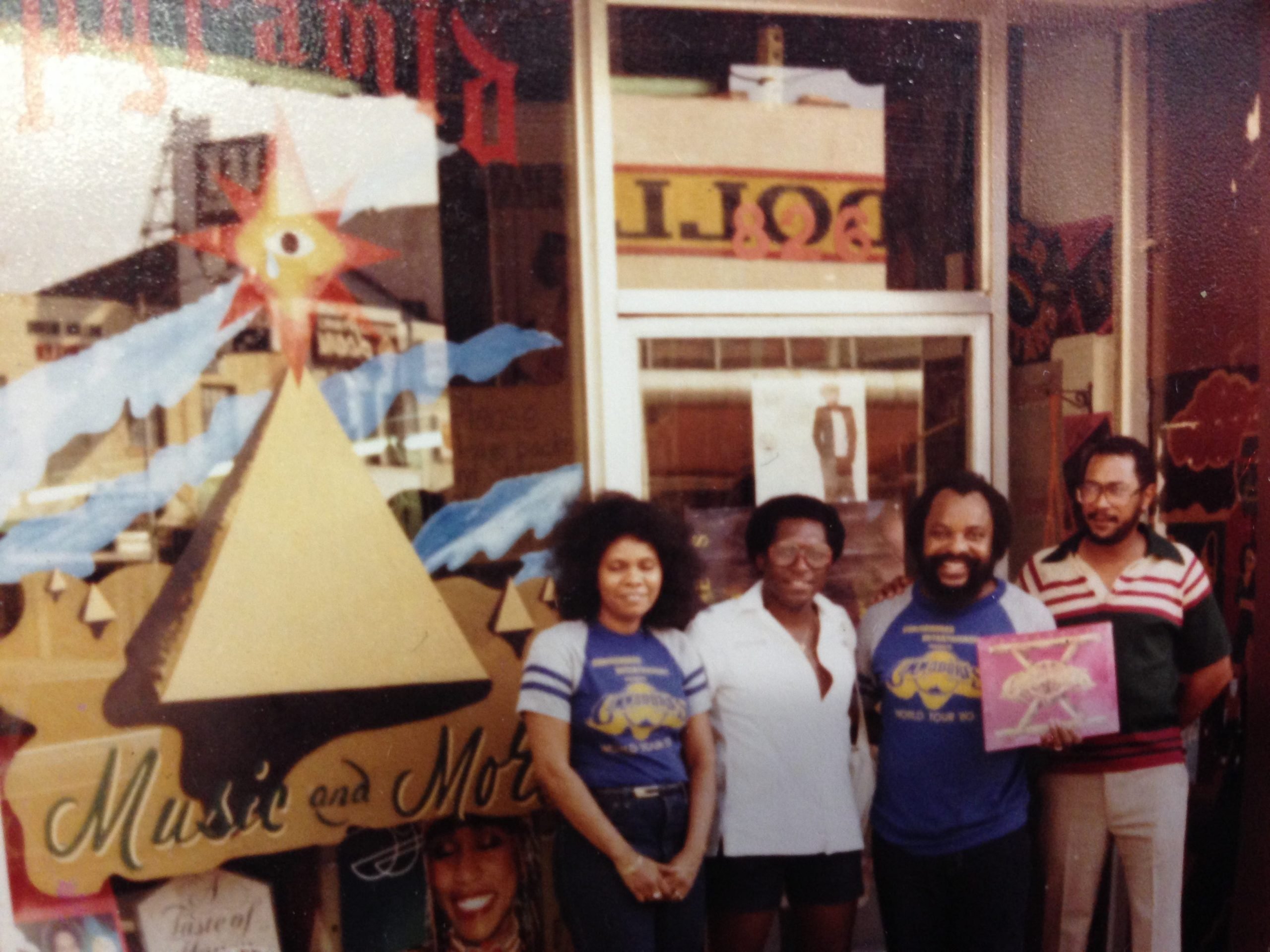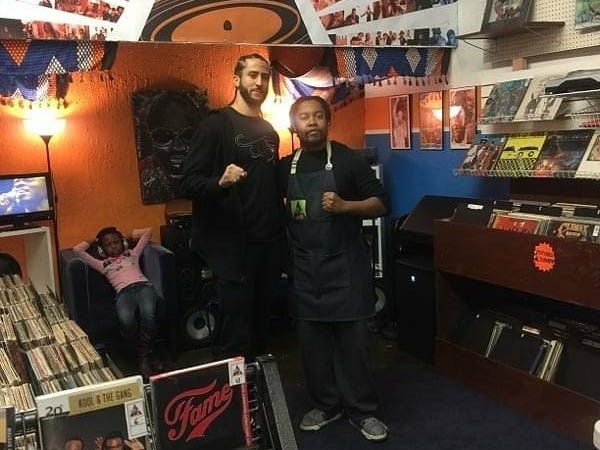
Sam Mellish/In Pictures via Getty Images
- In the '60s and '70s, there were as many as a thousand Black-owned record stores in the South alone.
- Today, only a fraction of the US's 2,500 record stores are owned by Black businesspeople.
- Black shop owners say a lack of product is the main difficulty in running a record store.
- Visit Insider's homepage for more stories.
When Le'Shawn Taylor started collecting vinyl records in college, he noticed a void in the vinyl community: There were no Black-owned shops. So in 2018, he opened Stokely's Records, in Valdosta, Georgia.
"I don't see no one like me doing this," Taylor said.
The 28-year-old sells vintage jazz, funk, and soul records by Black artists. He named his store after Stokely Carmichael, the US civil-rights activist who coined the phrase "Black Power."
In a sense, Taylor is continuing Carmichael's call for political, economic, and cultural empowerment by reclaiming Black music white shoppers might be quick to overlook and returning them to the Black community.
"Some of the best stores that specialize in what I do – I mean, they're all owned by white dudes," he said. "Of course, they know their stuff. I'm not knocking them.
"But in the back of my head, I'm, like, 'Damn, all this stuff, I'm pretty sure it was once owned by a lot of Black folks.' Some of them probably have no idea that it's valued that much or, like, the significance of what they once had. In my head I'm, like, 'Shoot, I gotta be one of the faces.'"
Even though he doesn't have a physical storefront anymore, Taylor hopes he can be one of the faces who help preserve the Black vinyl experience.
According to IBIS World, there are over 2,500 record stores in the US. In August, a member of the online music marketplace Discogs helped create a spreadsheet of Black-owned record stores, but as of this month there were only 36 businesses listed, and some are online stores, like Stokely's.
For Black History Month, Common teamed up with the Record Store Day organization and compiled a similar list of 29 Black-owned record stores, many of which overlap with the previous list.
The lists are by no means complete, but as 71% of US businesses are white-owned - compared to 9.5% Black-owned - the total number likely pales in comparison to white-owned stores.
Considering the majority of popular music from the past six decades has been rooted in Black music, and many artists owe their success to trailblazing Black musicians, you'd think there would be more Black-owned record stores. Not to mention that the vinyl industry is experiencing a resurgence.
After 14 consecutive years of positive growth, vinyl sales surpassed CD sales in the first half of 2020 for the first time since the 1980s. This year vinyl is already the No. 1-selling pure-album format in the US.
Despite early reports that the pandemic would harm record stores and vinyl sales, the growth never slowed. Discogs experienced more than a 33% increase in vinyl sales during the first half of last year, with sales skyrocketing during the early months of the pandemic when brick-and-mortar stores were closed.
In the midst of it all, the vinyl community is left trying to understand why most people on both sides of the record-shop counter are white.
Decades ago there used to be hundreds, if not thousands, of Black music stores
In a 2011 essay for SouthernCultures, Joshua Clark Davis, a historian at the University of Baltimore, wrote that during the '60s and '70s, there were between 400 and 500 Black-owned record shops in the South alone (though it was probably closer to a thousand).
Black-owned record stores across the country, but especially in the South, provided a sense of community for Black people at a time when they weren't welcome in white public institutions. In addition to having Black employees who were knowledgeable about Black music, some shops also sold beauty products, Black magazines, and clothing. Others started record labels or radio shows focused on Black music.
"By seeking out music from Black-owned record stores," Davis wrote, "African American consumers partook in a vibrant form of commercial public life, a community-based consumer culture that welcomed shoppers regardless of their color, age, or financial means."
Being a Black entrepreneur didn't come without challenges. Davis told Insider that Black record-store owners faced a number of societal and industry barriers during the '60s and '70s - including credit discrimination, difficulty getting loans, difficulty obtaining products from distributors, the stigma that Black entrepreneurs were more likely to fail - that made opening and maintaining a business difficult.
Some Black record-store owners feel those barriers haven't disappeared
Better Days Records, in Louisville, Kentucky, opened in 1979 and has been under the ownership of Ben Jones since about 1982.
Jones has two locations: Better Days West, which he calls his Black store "in the hood," sells exclusively rap, soul, R&B, and hip-hop LPs, and Better Days East, which sells exclusively pop and classic rock to a predominantly white customer base. The two locations are so separate, Jones said, that his Black customers don't even know he has a second location, adding that he couldn't keep his Black store open if it wasn't for the second location.
This is because when he contacts his distributors to order records by Black musicians that his Black customers actually want, like Betty Wright, Shalamar, or Graham Central Station, they're all on back-order.
But if he wants a Beatles or Pink Floyd album, Jones said, he has access to as many copies as he needs.

Courtesy of Ben Jones
"Now you tell me how I'm supposed to stay in business," Jones said. "The white shit I can get every day. The Black shit I can't get at all. Now, how am I supposed to stay in business? When you walk in and tell me, 'Don't they do it all the same?' No, they don't. It's us versus them.
"That's why we can't have a Black record store no more," he added. "Because [white customers] won't buy gospel, they won't buy soul, they won't buy jazz, and they won't buy just basic R&B or blues."
The dearth of Black vinyl may also stem from a lack of trust.
Walter Gibson has owned Jampac Records, in Monroe, North Carolina, since 1986. Gibson said that he wouldn't scan any product barcodes because he fears white record executives are collecting data about what Black consumers buy through his sales.
"If the big man sees you make a dollar off of something, he'll make a million," Gibson said. "He use you as the marketing tool. That's why I would never ever do any of this scanning or whatever else, because if you scan your product, and they know what's selling, the big man on the top will see what you're doing, and you think you making money, but no, you're working for him."
Gibson believes scanning barcodes leads to Black customers shopping at white-owned chain stores instead of in their neighborhoods.
"It gets back to his system, and he can put it in his stores twice as hard and twice as much," Gibson said. "So, therefore, that would take the people in your neighborhood when you were selling it to them for $10, the bigger store says, well, we got for $8."
It's unclear whether record labels and distributors are collecting data through independent record stores. What is undeniable is that at least one Black record-store owner has a mistrust of white business intentions related to a fear that such data would be manipulated to negatively affect Black businesspeople.
Shop owners say the lack of Black vinyl is a reflection of a whitewashed industry
Noura Gordon of Pyramid Music and More, in Augusta, Georgia, told Insider it's not that Black people aren't interested in vinyl. It's that labels aren't pressing the right Black music.
Gordon had the opportunity to talk with the label Rhino Records, a division of Warner Music Group, about its Black History Month collection of rereleased vinyl and told them it felt whitewashed.
Rhino released albums such as Aretha Franklin's "Young, Gifted and Black" and George Benson's "Breezin'," but Gordon said you could already find those albums used in record stores. Additionally, many of the records are on colored wax, which she feels Black customers don't care about and is just a money grab targeted at white customers.
Gordon said most of the vinyl pressed has been by artists who are dead, adding that there are numerous Black artists still alive whose vinyl hasn't been reissued in years.
If Rhino would have contacted a Black shop owner, she said, the campaign would've been much stronger.
"The people who are driving these record companies and making the decisions, they're telling Black people what they like, and that's the biggest problem," Gordon said. "People on the corporate side that aren't Black telling Black people and telling Black consumers, this is what you're going to have and this is what we're going to give you, so they're not pressing the right Black vinyl."

Courtesy of Noura Gordon
A Rhino spokesperson said that the label takes any perception of whitewashing seriously and emphasized that the campaign was intended to honor Black musicians and their influence.
"Our campaign featured timeless albums from some of the most important and ever-relevant Black artists in the history of music, such as Aretha Franklin, Lil' Kim, and Curtis Mayfield, as well as unique promotions offered exclusively to Black-owned record stores," the Rhino spokesperson told Insider. "Conversations about the importance of these artists and their music are crucial, and we look forward to continuing the dialogue so we can honor them in a positive and meaningful way."
This is why many Black shop owners say they rely on selling used instead of new vinyl so they can provide their customers with what they want.
Sir Froderick, owner of Fivespace, in San Diego, spent years digging through crates at swap meets and flea markets to find vintage hip-hop and rap vinyl. Five years ago he opened shop with the hopes of providing Black customers and hip-hop heads with a place to buy vinyl not normally available in white-owned shops.
"I go into a whole bunch of record stores," Sir Froderick said. "You'll never find something with a thick-enough hip-hop section - it will be so mediocre. If it's a white owner, they just don't know what to look for. If their customers don't tell them, they'll just grab what they know. So that's all you see. You'll see a reflection of whoever the owner is inside their stores."
The evolution of music consumption also harmed Black-owned shops
Davis said that white-owned record labels didn't take Black music seriously until the 1970s, and white-owned chain stores didn't sell Black music until the '80s.
Once they realized that certain Black artists resonated with white audiences, too, Black music started appearing in chain record stores in like Kmart and in malls. Pair that with integration and desegregation, and suddenly Black customers were shopping in the white-owned record stores that previously didn't welcome them.
It was the introduction of CDs in 1982, however, that hurt all vinyl retailers.
The stragglers who survived through the '90s were later hit with the 2008 recession. The streaming era proved to be the nail in the coffin for many shop owners, but especially Black record-store owners who could no longer afford the rising rents in their often gentrified neighborhoods and business districts.
Even now, amid the vinyl resurgence, the physical Black record-store space is still suffering. Davis said nowadays the big money to be made in vinyl is online, where predominantly white and foreign collectors pay top dollar for rare records.
Pyramid Music and More has been open since 1974, but has been online-only for more than a year because of family matters and the pandemic. Gordon told Insider that she liked the pop-up sale and online approach, especially since she's saving money on mortgage and bills.
Davis, the historian, said the one upside that Black record stores still have today is the sense of community they bring to a neighborhood.
"That community aspect is almost a prerequisite now," he said, adding that for traditional brick-and-mortar shops it would be "very tough going up against online retailers. If all you have to offer is the tangible product."
That's what Jonathan Blanchard set out to do when he opened JB's Record Lounge, in Atlanta, in 2017. Despite his store only being 560 square feet, he turned it into a performance space, citing the lack of venues for Black artists to perform in as inspiration.

Courtesy of Jonathan Blanchard
"It makes me feel like I'm doing something other than running my mouth about the problem," Blanchard said.
As the popularity of vinyl continues, Black record-store owners said they felt that racial oppression and discrimination within the industry would not go away unless more Black people got involved in both the corporate and the retail sectors.
Pyramid Music's Gordon said she appreciated the increased urgency to support Black businesses like hers after the resurgence of the Black Lives Matter movement following the police killings of George Floyd and Breonna Taylor in 2020. But she felt it was too little too late.
"It's time to speak up," Gordon said. "Because it's, like, we've been screaming it. We've been busting down the door, our voices are hoarse. We're tired, but we're not going to give up."